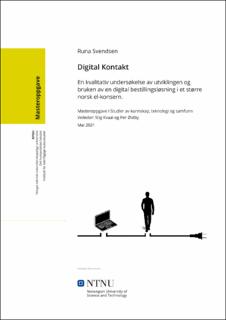| dc.contributor.advisor | Kvaal, Stig | |
| dc.contributor.advisor | Østby, Per | |
| dc.contributor.author | Svendsen, Runa. | |
| dc.date.accessioned | 2021-09-24T18:31:01Z | |
| dc.date.available | 2021-09-24T18:31:01Z | |
| dc.date.issued | 2021 | |
| dc.identifier | no.ntnu:inspera:78640361:46832888 | |
| dc.identifier.uri | https://hdl.handle.net/11250/2781827 | |
| dc.description.abstract | Den fjerde industrielle revolusjon kan være et springbrett for innovasjon, utvikling og digitalisering for norsk næringsliv. I en tid der teknologidrevet innovasjon er mer utbedt og tilgjengelig, ønsker bedrifter å dra nytte av teknologien. På tross av at innføringen av nye teknologier beskrives som revolusjoner, store sprang og løsningen på alt, er det mer sjeldent det det skrives om hva som egentlig skjer i utviklingsprosesser.
Denne masteroppgaven undersøker hvordan en digitaliseringsprosess fungerer i praksis, og hva bedrifter kan lære av å involvere brukerne i utviklingsprosessen. For å besvare problemstillingen anvender jeg STS-perspektiver som Skript og Domestisering.
Masteroppgaven er basert på kvalitativ metode og datamaterialet består hovedsakelig av intervjuer med fem informanter.
Strøm & Elektro digitaliserte sin bestillingsløsning på elektriker for å tilrettelegge for at privatkunder kunne få en fast elektriker. Næringskunder av Strøm & Elektro har som regel én elektriker de forholder seg til, men slik var det ikke for privatkundene. Bedriften hadde i tillegg en forståelse av at kundene ønsket fleksibilitet. Derfor utviklet de en løsning der det var mulig for kunden å bestille elektriker på ønsket tid og dag. Slik ble Strøm & Elektro den første i markedet med digital bestillingsløsning, noe de håpte kunne tiltrekke nye kunder.
Bedriften ønsket å komme det anså som kundebehovet i møte. I intervjuene kom det frem at den digitale løsningen fungerer bra på flere områder, og utviklerne omtaler det som et vellykket prosjekt. På tross av det viser funn fra analysen at bestillingsløsningen byr på noen utfordringer. Mine funn tyder på at utfordringene er knyttet til utviklerens brukerforståelse, involvering av ansatte i utviklingsprosessen og uklare målsetninger ved prosjektstart. Et fellestrekk for mine funn, er at de understreker at behovsdrevet brukermedvirkning er et viktig bidrag i utformingen av en løsning som er tilpasset ansatte og markedet. | |
| dc.description.abstract | The fourth industrial revolution could be a springboard for innovation, development and digitalization of Norwegian businesses. In a time where technology driven innovations are widespread and accessible, businesses looks to utilize this as best they can. Despite the claim that the introduction of such new technologies are often described as revolutions, quantum leaps or the solution to everything, there is a lack of understanding of the processes involved in this.
This thesis explores the practicalities of a digitalization process, and the aspects learned by involving the users in the process. STS-perspectives, such as Script and Domestication were utilized to answer the question in hand. A qualitative approach meant that the data collection was completed by in depth interviews with five subjects.
Strøm & Elektro digitalized their electrician ordering solutions, giving private customers the opportunity to choose their designated electrician. Business customers of Strøm & Elektro has had the opportunity for this previously but the company wanted to expand this to their private customers. The company also understood that the customers often wanted a more flexibility, and such decided to give the customers the opportunity to book time-slots for their electrician. Strøm & Elektro became the first company in their marked group to utilize this, which they hoped would attract new customers. They wanted to meet the needs of the customer before it appeared.
In the conducted interviews it was highlighted that several aspects of the digitalized solution is working well, and the developers of the project is regarding it as a success. Spite this, the findings in this thesis has identified certain challenges that needed to be examined. These findings suggests that the challenges are related to the developers´ user understanding, the involvement of the employees in the process and unclear objectives from the start of the process. A common nominator of the findings suggest that demand-driven user participation is a crucial contributor for the development of solutions adapted towards the employees and the marked needs. | |
| dc.language | nob | |
| dc.publisher | NTNU | |
| dc.title | Digital Kontakt. En kvalitativ undersøkelse av utviklingen og bruken av en digital bestillingsløsning i et større norsk el-konsern. | |
| dc.type | Master thesis | |
